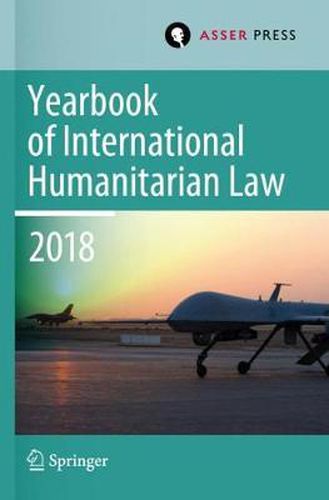Readings Newsletter
Become a Readings Member to make your shopping experience even easier.
Sign in or sign up for free!
You’re not far away from qualifying for FREE standard shipping within Australia
You’ve qualified for FREE standard shipping within Australia
The cart is loading…






This title is printed to order. This book may have been self-published. If so, we cannot guarantee the quality of the content. In the main most books will have gone through the editing process however some may not. We therefore suggest that you be aware of this before ordering this book. If in doubt check either the author or publisher’s details as we are unable to accept any returns unless they are faulty. Please contact us if you have any questions.
The main theme of this volume of the Yearbook of International Humanitarian Law is weapons law. In several chapters, how International Humanitarian Law (IHL) copes with old and new weapons as well as political developments in regard to military technology is discussed, while in two chapters the significance of non- or less-lethal weapons in peace-keeping and law enforcement operations as well as the legality of lethal autonomous weapon systems under IHL are analysed. Moreover, the volume describes the current status of nuclear deterrence under international law. Another layer is added by examining how IHL influences the programming of automatic target recognition systems using artificial intelligence.
The second part of the book contains a historic perspective on the roots of IHL in Europe, which can be traced back to the ninth century, as well as a Year in Review describing the most important events and legal developments in the area of IHL that took place in 2018.
The Yearbook of International Humanitarian Law is the world’s only annual publication devoted to the study of the laws governing armed conflict. It provides a truly international forum for high-quality, peer-reviewed academic articles focusing on this crucial branch of international law. Distinguished by contemporary relevance, the Yearbook of International Humanitarian Law bridges the gap between theory and practice and serves as a useful reference tool for scholars, practitioners, military personnel, civil servants, diplomats, human rights workers and students.
$9.00 standard shipping within Australia
FREE standard shipping within Australia for orders over $100.00
Express & International shipping calculated at checkout
This title is printed to order. This book may have been self-published. If so, we cannot guarantee the quality of the content. In the main most books will have gone through the editing process however some may not. We therefore suggest that you be aware of this before ordering this book. If in doubt check either the author or publisher’s details as we are unable to accept any returns unless they are faulty. Please contact us if you have any questions.
The main theme of this volume of the Yearbook of International Humanitarian Law is weapons law. In several chapters, how International Humanitarian Law (IHL) copes with old and new weapons as well as political developments in regard to military technology is discussed, while in two chapters the significance of non- or less-lethal weapons in peace-keeping and law enforcement operations as well as the legality of lethal autonomous weapon systems under IHL are analysed. Moreover, the volume describes the current status of nuclear deterrence under international law. Another layer is added by examining how IHL influences the programming of automatic target recognition systems using artificial intelligence.
The second part of the book contains a historic perspective on the roots of IHL in Europe, which can be traced back to the ninth century, as well as a Year in Review describing the most important events and legal developments in the area of IHL that took place in 2018.
The Yearbook of International Humanitarian Law is the world’s only annual publication devoted to the study of the laws governing armed conflict. It provides a truly international forum for high-quality, peer-reviewed academic articles focusing on this crucial branch of international law. Distinguished by contemporary relevance, the Yearbook of International Humanitarian Law bridges the gap between theory and practice and serves as a useful reference tool for scholars, practitioners, military personnel, civil servants, diplomats, human rights workers and students.